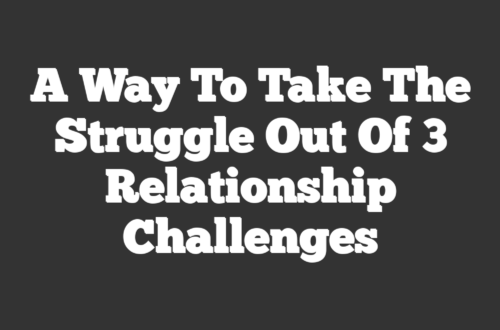
Years ago, I was in an unhealthy relationship. One could even say it was toxic, and they would not be wrong. When I met that guy, I thought I had hit the jackpot with him. In the beginning, our relationship seemed pretty normal. All couples fight, but our fights were minor and quickly solved. However, over time, the small arguments grew into huge monsters. Where there was once an apology and accountability, now sat insults and shame. The aggressive fighting was gradual, but when it arrived, it arrived in full force. The way my partner yelled at me in public, shamed me, and humiliated me, changed me as a person. I was not a fighter or a name-caller when I first met him, but soon I found myself trying to out-fight him, and I was seeing myself in a light I no longer liked or respected.
What do couples fight about?
Couples fight for many reasons. Some reasons are deep-rooted, while others are related to small daily things. What do you do when daily frustrations start getting in the way? You talk about them and let your partner know how you feel. If things don’t change, you don’t have to stay in the relationship. Sounds simple, right? However, before making a permanent decision based on temporary feelings, you have to consider if what you are fighting about are minor issues or deal-breakers. Here is a list of the most common reasons why couples fight.
Liking pictures of the opposite sex on social media can quickly become a huge issue in a relationship. Our private lives are on display for everyone to see, and an innocent like or comment can be enough to trigger a fight. You can feel insecure if your significant other is attracted to others.
Sex
Couples fight about sex a lot. Not having enough sex, having too much sex, or even arguing about what kind of sex you want more or less of. Fighting over sex can affect your emotions and your physical connection with your partner.
That damn phone
With phones glued to their hands, many people have an issue with this in their relationships. Scrolling through social media may seem innocent enough after a long day of work, but if you are with your loved one and pay more attention to your phone, your partner may feel like they are being ignored.
When you move in together, at first it is fantastic. It’s cute to see your partner’s socks under the table or a wet towel on the floor. But after a while, “sure I can do the dishes… again” starts to get old, and fights break out when the wet towel begins to smell.
When you move in together, at first it is fantastic. It’s cute to see your partner’s socks under the table or a wet towel on the floor.
Click To Tweet
Friends
You can get comfortable in a relationship real quick. Once your partner’s friends are introduced to you, sometimes they hang around too long or require too much attention from your partner. It can upset you as they take precious time away from building something solid with a person you love.
Past relationships
The past can come haunting. Does your current partner still have their ex’s stuff in their house? Do they talk to each other to catch up and try to remain friends with their ex? That can damper the beginning of a new relationship and leave the new partner frustrated.
Money
Does the conversation “Who is going to pay? I paid last time. Now it is your turn.” sound familiar? Money is a common argument between couples that happens so often it almost seems normal. The one who earns more money is usually expected to pay more, making the other partner feel like they are the only one pulling their weight, and that’s a tough spot to be in.
Readiness for commitment
The questions of when you will be exclusive in a relationship or move in together can put a relationship to the test. One person may be more ready for a commitment, and the other may be dragging their feet. Being more focused on furthering a career rather than building a family can cause an ongoing argument.
Being more focused on furthering a career rather than building a family can cause an ongoing argument.
Click To Tweet
Not feeling appreciated
When one partner is putting in more work or feeling as if they are not being appreciated, that can lead to anger and cause fights in unexpected places. Slamming down dishes because you were not thanked for cooking dinner can leave confusion on the table for dessert.
Jealousy
Jealousy is one of the most common reasons why couples fight. Did your partner go out without you? Did they smile at their female colleague in the street? However, in most cases, it has nothing to do with the colleague. When you don’t feel important, you begin to get jealous without realizing what the root problem in the relationship is.
Kids
Couples fight about kids. Should we have them? Do you want to have them? If so, when, how many, and how will we raise them? Women especially can feel pressure to have kids, which can cause friction in a relationship. When the man feels pressured to become a parent before he is ready, it can lead to him trying to exit the relationship.
Lack of communication
Couples fight when they feel their partner is not communicating with them enough. The reason can be anything from “Why didn’t you tell me you fed the dog?” to “I had no idea your parents were stopping by tonight!” Lack of communication can make you feel ignored.
How to fight in a constructive way: 12 tips
After leaving my toxic relationship, I got help. I found a recovery program for my anger and codependency issues. I learned a lot about how to fight in a healthy, constructive way. Here are some of the things I learned that helped to guide me in my new healthy relationship.
1. Don’t downplay the issue
You may not believe that the issue you are fighting about is important, but if your loved one does, it is necessary that you acknowledge you are hearing them. People don’t just stop feeling a certain way because we want them to. If the issue is not resolved, it will continue to come out in other conversations or fights. Validation is important for both partners, but not always at the same time.
2. Talk when you are both ready
Before the anger sets in and before you feel the urge to say something you may regret, tell your partner how you are feeling. It is key to voice your feelings at the right time. Don’t try to have the conversation as your partner is running out the door or prepping for a meeting. Get your thoughts together, have a meal together, and sit down when things are calm. Be direct to the point in a gentle manner, and be sure to make eye contact.
3. Respond, don’t react
When someone upsets you, often your first response is saying something mean or hanging up on that person. Behavior like this will only create a bigger distance from your partner and won’t help to find a solution to your problem. Instead, ask yourself, “Does this person care about me?” or “Does this person have bad intentions toward me?”. The answer will most likely be “no.” Take a deep breath in and respond. You don’t want to hurt your partner further by reacting.
4. Work toward a resolution together
After you have had a fight and you found a resolution you are both happy with, let it go. I know I know, those are not the three words you like to hear, but in order for you to move forward, you must genuinely forgive each other. When fighting in a relationship, there are no winners. You work together as partners, not as competitors.
When fighting in a relationship, there are no winners. You work together as partners, not as competitors.
Click To Tweet
5. Avoid name-calling
Name-calling is hurtful, and it is disrespectful. If this happens, apologize for what you said and didn’t mean when you were fighting. Nothing good comes out of calling your partner something awful while you were angry. The stigma of being called names will stay long after the fight is over.
6. Take turns speaking
If you are able to keep your fight civil, get out a stopwatch, set the timer for 5 minutes, and each takes a turn expressing why they are upset or mad. Let your partner get it all out without interruption. Let them speak their piece and just listen. Have a notepad close by and take notes if you want to. When people feel heard, they are more likely to respond in a rational way.
7. Don’t threaten your partner
Fighting can be complicated and confusing, but threatening your partner is never OK. A threat of causing bodily harm, moving out, or even breaking up during a fight is uncalled for. If you can’t help it, it may be a good idea to take a few minutes in another room and come back when you feel calm enough to talk.
8. Hear them out
While your partner is speaking, listen to what they are saying. Do not listen to respond; hear what your partner has to say. It may be helpful in your relationship in the future. If you are just waiting for a chance to snap at your partner without hearing them out, no one will be happy.
If you are just waiting for a chance to snap at your partner without hearing them out, no one will be happy.
Click To Tweet
9. Take a walk
If you see things are getting heated and your partner is beginning to react instead of responding, it may be best to walk away for a bit. Take a stroll in the neighborhood, or walk to the store. Get out of the house and clear your mind. Do not go to the TV or a gaming system. Walking will help to get your thoughts together.
10. Leave the past in the past
While arguing with your partner, it is easy to bring up unresolved issues from previous fights. This is why it is best to fight, come up with a solution, and then let it go. But that is not always how it happens. When fighting, fight about what is going on at present and not what has happened previously. Digging up old arguments will only make things worse.
11. Avoid accusations
Telling your partner that they are too emotional or accusing them of something can cause them to second guess themselves, especially while in a fight. If you feel your partner is acting on emotions, set aside some time to have a serious conversation later on. The middle of a heated fight is not the time for that.
12. Admit when you are wrong
In an ideal world, none of us would be wrong, ever. But as a fighting couple, you know you are not living in a perfect world. At times, more often than you would like to admit, you are not right, and you need to take accountability for your actions and apologize when you need to, not when you are supposed to.
How often should couples fight?
So, how often do healthy couples fight? In healthy relationships, it is not as important how often you should fight, but rather how you fight. Couples should fight as often as necessary in order to move the relationship forward.
If you hold in things when you are upset, you will not grow, and your partner will not have an opportunity to get to know you better. It is while you are vulnerable, raw, and exposed that you show your true self to others. In those moments, you also learn who you can trust.
After you fight with your partner, if you don’t feel happy with the solution, or if the same fight keeps coming up over and over, it can get mentally and emotionally draining.
When your relationship feels exhausting, it may be time for a serious sit-down to discuss it. But all in all, after a healthy fight, you should feel secure, heard and you should have a solution to your issue or a plan to work toward a solution together.
Couples should fight as often as necessary in order to move the relationship forward.
Click To Tweet
When I had the dreaded first fight with my boyfriend, I had no idea who I was going to be. I almost felt as if I was taking the final exam for a test I had been studying for years, and in a way, I was. Not only did I need to see who he was when he was angry, but I also needed to see if I had fully become the woman I worked so hard to be.
We fought over something silly, but in those moments, I didn’t react; I responded. I didn’t yell, I told him calmly I was going to leave, and calmly, he agreed to me leaving. I left and didn’t add my two cents to the fight.
Hours later, we had a conversation and talked it through—no need to apologize for name-calling or violent acts. We didn’t ignore each other and took the right amount of time apart to cool off. Our ability to admit when we are wrong is what keeps our relationship strong. Even today, years later, our fights are healthy. Every step I took to heal got me to this place in my life, and I am so thankful for that.
A tip I would give to those in relationships: get a picture of your partner from when they were a child, frame it, and keep it out in the open where you can easily see it. When you fight or get annoyed with them, look at the picture, and you will remember the innocence living within the person you love.




